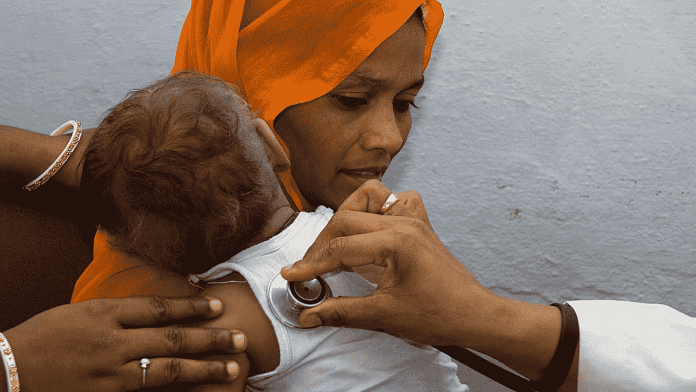New Delhi: A first-of-its-kind trial supported by the Indian Council of Medical Research (ICMR) has found that improving the nutrition of the family members of a tuberculosis patient can lead to a 39–48 percent reduction in the incidence of the disease in the household.
The study, published in The Lancet on 9 August, was based on the findings of the Reducing Activation of Tuberculosis by Improvement of Nutritional Status (RATIONS) trial, conducted by the Yenepoya Medical College, Mangaluru, and supported by the Union government’s National TB Elimination Programme (NTEP), the National Institute for Research in Tuberculosis (NIRT), Chennai, and ICMR.
This is the first time a study assessed the link between nutrition and preventing new TB cases.
The study showed that improving nutrition levels in family members of patients with lung TB substantially mitigated their risk of developing the disease.
The trial, says the study, showed that nutritional supplementation reduced the incidence rate among household contacts by 39 percent in “all forms of tuberculosis”, and by 48 percent in cases of microbiologically confirmed pulmonary tuberculosis (MCBT).
Tuberculosis is an infectious bacterial disease, which most commonly affects the lungs (pulmonary TB), but can damage other parts of the body too. MCBT is when the disease is confirmed through specific laboratory tests.
Significantly, an accompanying paper published the same day in The Lancet Global Health, showed that severe undernutrition was present in nearly half of the TB patients in the trial, underlining the need for nutritional support.
According to the researchers, an early weight gain in the first two months of starting nutritional support was associated with 60 percent lower risk of TB mortality. Other benefits included higher rate of success for treatments and better weight gain during follow-up.
According to the second paper, only 3 percent of those suffering from tuberculosis were able to work for a living at the enrollment stage of the clinical trial “but this figure rose to 75 percent at the end of treatment”.
“Findings from these studies will have huge policy implications in all the countries with high burden of TB,” Soumya Swaminathan, chairperson of the Chennai-based non-profit M.S. Swaminathan Research Foundation and a former chief scientist of the World Health Organization (WHO), said at the release of the papers at a virtual event.
Swaminathan, a former director general of the ICMR, also underlined that undernutrition has been a leading risk factor in both India’s high TB incidence and its mortality rate. She added that previous studies conducted by the NIRT had highlighted that TB patients who weighed less than 35 kg had four times higher mortality than those who weighed over 45 kg.
India has one of the largest burdens of tuberculosis globally, with an annual estimated incidence of 27.7 lakh cases in 2022, according to a government report. The country is aiming for an 80 percent reduction in TB incidence and 90 percent reduction in TB mortality by 2025.
Also Read: More TB cases being reported but yet to reach pre-pandemic levels: Health ministry report
Impact of ‘food baskets’
The trial spanned three years, from August 2019 to August 2022, and took place in four districts of Jharkhand. It followed a cluster-randomised design, where groups of individuals were randomly assigned to different treatment arms.
According to the papers, the trial was aimed at studying the effect of nutritional supplementation on TB incidence in 10,345 household contacts of 2,800 patients who were undergoing treatment with the NTEP.
All patients in the trial received a “food basket”, which included a mix of various food items such as rice, pulses, milk powder, and oil, amounting to 10 kg in total, along with multivitamins, for a duration of six months.
Among family members, the “intervention group” also received a food basket comprising 5 kg rice and 1.5 kg pulses per head every month. The control group of family members, on the other hand, did not receive a food basket.
According to the study, 218 new cases of TB were detected in the follow-up. Of these, 2.6 percent were in the control group and 1.7 percent in the intervention arm.
“[T]his is the first randomised trial looking at the effect of nutritional support on
tuberculosis incidence in household contacts, whereby the nutritional intervention was associated with substantial (39–48%) reduction in tuberculosis incidence in the household during 2 years of follow-up,” the paper said.
This “biosocial intervention” can accelerate reduction in tuberculosis incidence in countries or communities with both tuberculosis and undernutrition, it added.
“Undernutrition is the commonest cause of acquired immunodeficiency in India and worldwide,” Anurag Bhargava, the lead author of the study, said in a statement. “That a low-cost food-based nutritional intervention could prevent TB to a significant degree is very encouraging.”
Madhavi Bhargava, a co-researcher on the project, pointed out that given the findings, nutritional support needs to be an essential part of patient-centred care in the Indian context.
In her statement, Swaminathan said that in India, undernutrition is the most prevalent risk factor in India “accounting for over 40 percent of new (incident) cases every year”.
In 2018, the Union government launched the Nikshay Poshan Yojana under which it transfers Rs 500 a month to TB patients for their nutritional needs. Contacts of the patients, however, are not supported through the scheme.
(Edited by Uttara Ramaswamy)
Also Read: Covid’s unseen toll in India — 38% dip in screening for TB that’s still a major health crisis



